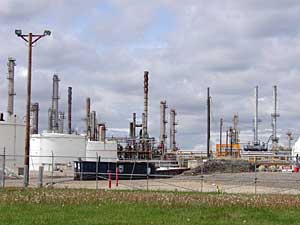|
Audio
Photos
More from MPR
Resources
Your Voice
|
Gasoline prices not finished rising yet
May 17, 2004
 |
| An equipment breakdown has reportedly shut down production at the Marathon Ashland Petroleum Refinery in St. Paul, a potential loss of up to 26,000 gallons of gasoline a day. (MPR Photo/Bob Collins) |
Duluth, Minn. — Experts say rising gas prices are from a bad combination of factors, including unrest in the Middle East, high demand from China, and what kind of vehicle is sitting in your driveway.
Dave Podratz, who manages the Murphy Oil Refinery in Superior, Wisc., says gasoline prices reflect supply and demand - and right now demand is running way ahead of the supply of gasoline.
Murphy Oil is one of three refineries in the region serving primarily the Twin Ports area. The other two are in the Twin Cities. It's refineries that turn crude oil into products, like kerosene, diesel fuel and gasoline.
"We're running at full capacity," he says. "We couldn't make any more gasoline if we wanted to. And if demand picks up to the point that we're not making enough to supply the market, that's got to come from somewhere else. That market may be short, and prices are just going to go up."
Minnesota's supply just got a little bit tighter. An equipment breakdown has reportedly shut down production at the Marathon Ashland Petroleum Refinery in St. Paul, a potential loss of up to 26,000 gallons of gasoline a day. Marathon Ashland officials say they're bringing in gas from other markets. But Podratz says gasoline supplies were already a problem.
"Gasoline inventories remain very low. And that's always a sign that the slightest interruption could cause a pretty big price spike," he says.
Podratz says the nation's petroleum refineries aren't pumping out enough gas. He says refineries are expensive and unpopular.
"Nobody wants to invest in a refinery because there's no money to be made. It's also very difficult to build a refinery -- you have to get it permitted -- and I can't think of a whole lot of places in the country that would welcome a facility like a refinery. You know, it's not the kind of things people want in their backyards."
There are half as many refineries now as 20 years ago. The United States imports gasoline and crude oil, competing with other countries for both. That's where China comes in. The Chinese are importing 33 percent more oil this year than just a year ago. Their economy is demanding fuel for construction, and a middle class that's driving cars.
And another reason demand is up is we're driving gas hogs. Sales of SUVs were up 18 percent last year, over the year before. Car sales were down 4 percent. People are buying bigger, less fuel-efficient vehicles.
For motorists, it can help to shop around. Prices in Superior, Wisc., are often 10 cents higher that across the bridge in Duluth, Minn. The difference is in Wisconsin's tax on gasoline. In the Twin Cities, prices might vary up to a quarter a gallon.
Jason Toews, who tracks prices on his Web site, Minnesotagasprices.com, says prices often vary depending on where a gas station is located.
"Well certainly, interstates are a place where they usually have higher-priced gas, because it's almost an impulse purchase, or they get people traveling through the area, which they don't actually know the prices in that area. So they just buy gas when they see a gas station," he says.
Toews also predicts higher prices, at least into next month.
"We actually expect gas prices to continue to rise a bit, at least until the beginning of June, if not longer. I wouldn't be surprised to see it go up probably another 10 or 20 cents a gallon from where it is right now," he says.
Oddly, predicted price drops in crude oil are, in the short term, backfiring. OPEC is expected to increase production in the Middle East, which should drive prices down. But Murphy Oil's Dave Podratz says OPEC's announcement might just keep prices high in the coming weeks.
"So everybody is expecting that OPEC is going to increase production. Because everybody is expecting that, nobody is buying oil right now. Why would you buy a tanker, or two million barrels of oil today, if you're expecting the price to be lower next week?" he says.
When prices are adjusted for inflation, gasoline is still cheaper than it was in 1980. But the expense to a typical household may not be the real problem. It's what price inflation might do to the economy. Fuel prices can drive up the price of almost everything. And inflation can stop economic recovery in its tracks.
|
News Headlines
|
Related Subjects
|
